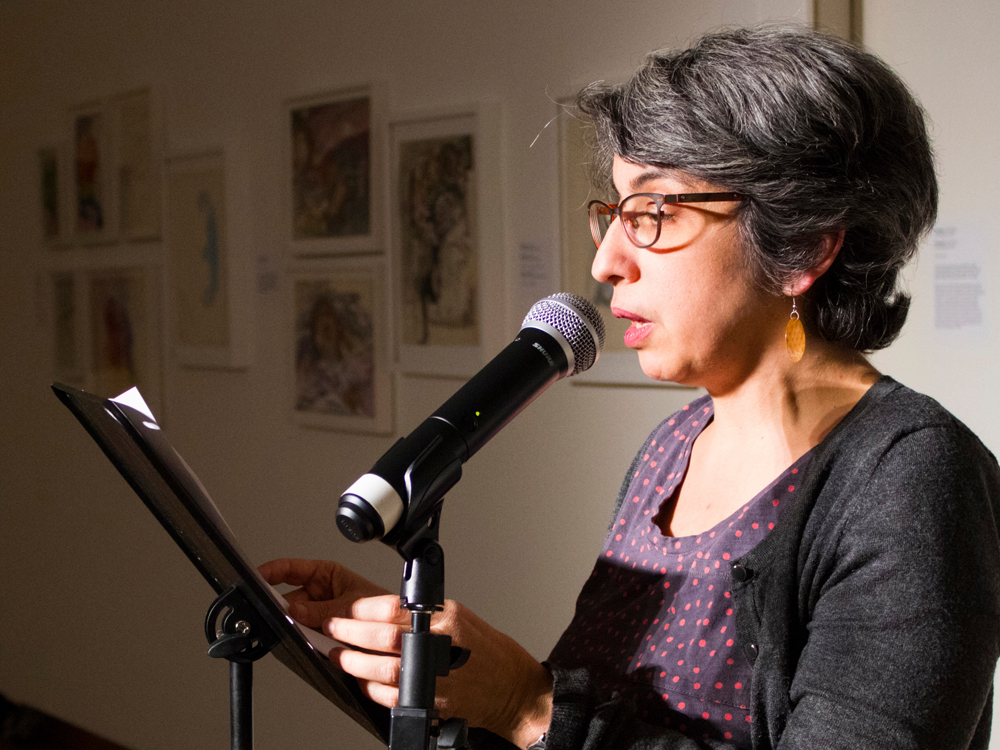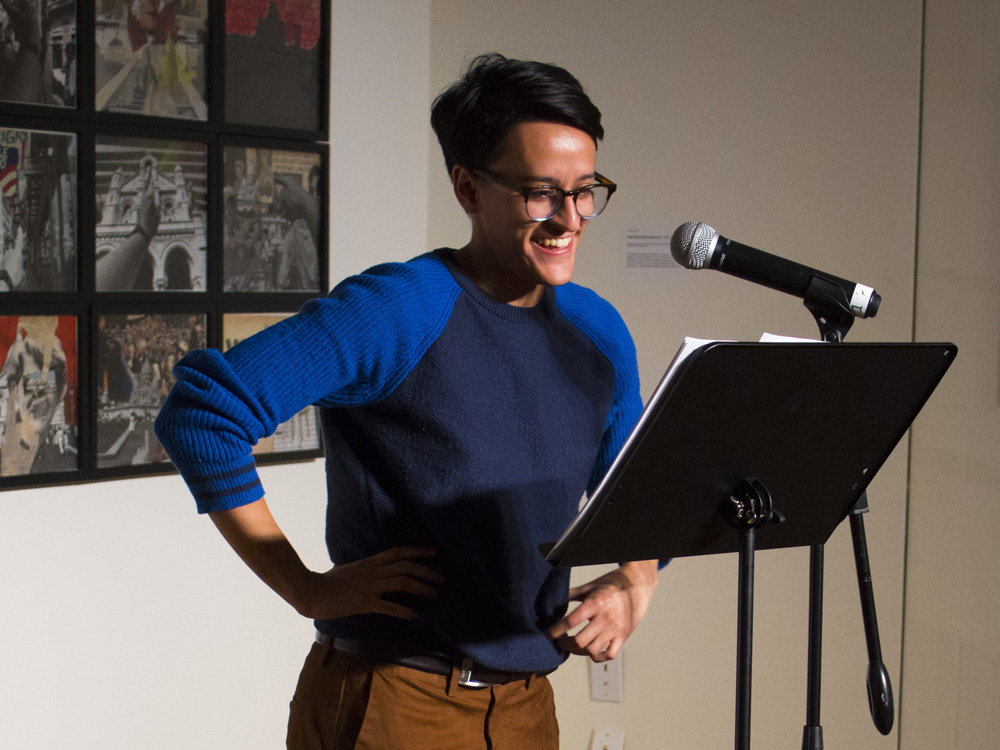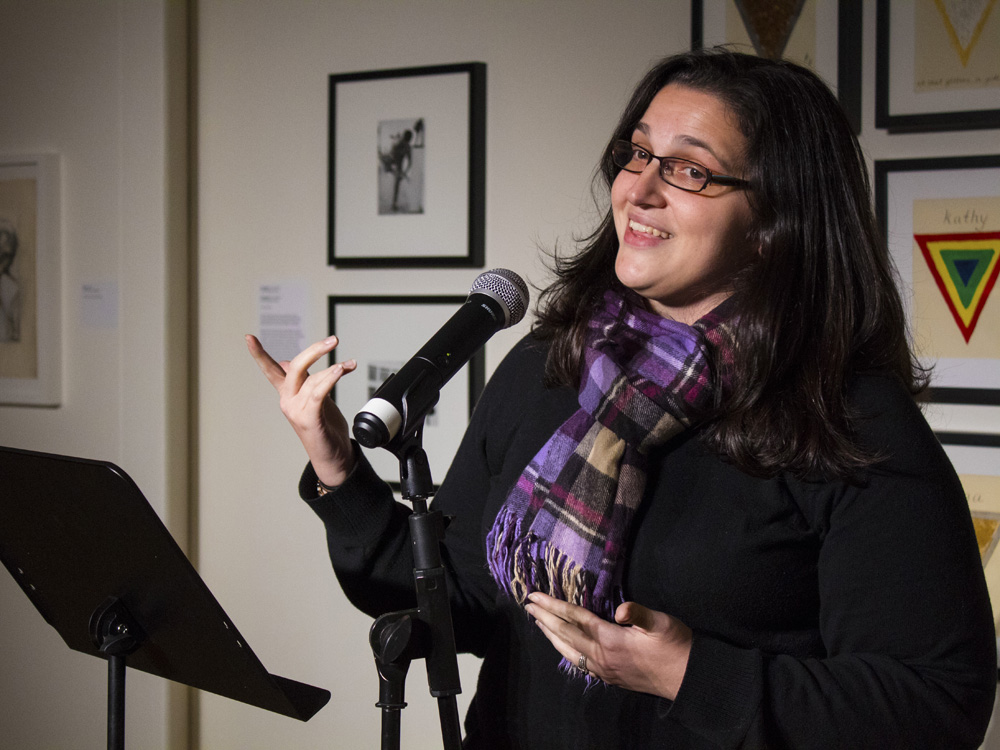Nancy Agabian is the author of Princess Freak (Beyond Baroque Books, 2000) and Me as Her Again: True Stories of an Armenian Daughter (Aunt Lute Books, 2008), which was honored as a Lambda Literary Award finalist for LGBT Nonfiction and shortlisted for a William Saroyan International Prize. Her novel manuscript The Fear of Large and Small Nations was a finalist for the PEN/Bellwether Prize for Socially Engaged Fiction. Agabian teaches creative writing at the Gallatin School of Individualized Study at New York University and for Heightening Stories, a series of community-based writing workshops online and in the Jackson Heights neighborhood of Queens, New York where she lives.
 Sitting at a folding table at the Leslie-Lohman Museum of Gay and Lesbian Art, I worry that I am not queer enough. Some of the texts I’ve brought in to teach the Creative Writing From Queer Resistance workshop feel like old friends, read long ago, but others I haven’t even read yet. We will consider them each week on what I conceive as a timeline of queer liberation: Stonewall; feminist lesbian liberation; AIDS and Act Up; trans, bi, and gender/sexual fluidity; and marriage equality. But isn’t categorizing ongoing activism into History with a capital H decidedly not queer? And how am I an expert on resistance? I’m a forty-nine-year-old bisexual cis woman still healing from an abusive relationship six years ago, undergoing menopause, and caring for my elderly parents. How will I speak to the young people who sit around the table with me?
Sitting at a folding table at the Leslie-Lohman Museum of Gay and Lesbian Art, I worry that I am not queer enough. Some of the texts I’ve brought in to teach the Creative Writing From Queer Resistance workshop feel like old friends, read long ago, but others I haven’t even read yet. We will consider them each week on what I conceive as a timeline of queer liberation: Stonewall; feminist lesbian liberation; AIDS and Act Up; trans, bi, and gender/sexual fluidity; and marriage equality. But isn’t categorizing ongoing activism into History with a capital H decidedly not queer? And how am I an expert on resistance? I’m a forty-nine-year-old bisexual cis woman still healing from an abusive relationship six years ago, undergoing menopause, and caring for my elderly parents. How will I speak to the young people who sit around the table with me?
We can learn to work and speak when we are afraid in the same way we have learned to work and speak when we are tired. —Audre Lorde
 The gallery walls are hung with images of naked bodies. Workshop participants, women and nonbinary, introduce themselves. A pattern emerges: They want to reconnect with their writing. They have felt alone in the current political moment. They have wanted a place where they can be all of who they are—in race, culture, religion, and identity—and where queerness is not the otherness in the room. Someone asks, “When we discuss the texts, do we have to analyze them, or can we talk about the feelings and experiences they call up in us?” Over the next few weeks, our conversations crackle and spiral, one person’s thoughts inspiring a response in someone else; people want to talk about their lives with each other as much as they want to write.
The gallery walls are hung with images of naked bodies. Workshop participants, women and nonbinary, introduce themselves. A pattern emerges: They want to reconnect with their writing. They have felt alone in the current political moment. They have wanted a place where they can be all of who they are—in race, culture, religion, and identity—and where queerness is not the otherness in the room. Someone asks, “When we discuss the texts, do we have to analyze them, or can we talk about the feelings and experiences they call up in us?” Over the next few weeks, our conversations crackle and spiral, one person’s thoughts inspiring a response in someone else; people want to talk about their lives with each other as much as they want to write.
The danger in writing is not fusing our personal experience and worldview with the social reality we live in, with our inner life.... What validates us as human beings validates us as writers. —Gloria Anzaldúa
Halfway through the workshop, someone brings pumpkin chiffon cake on the evening we discuss Hunger (HarperCollins, 2017) by Roxane Gay, and it’s an experience. So is Gay: We have three other texts to discuss, but her descriptions of what she feels she deserves and doesn’t deserve in the way of love, as a survivor of gang rape, is enough for us. Someone says, “What she says about sexual violence in relation to queerness is something we don’t always want to admit.” We talk about accepting sexuality not as fixed biology, but humanity. Something shifts in me; I let go of my fear and find my purpose in holding the space.
My warmth was hidden until I found the right people with whom to share it, people I could trust.... —Roxane Gay
 When someone asks, “Can we read non-American or non-Western texts?” I ask for their input. At our final workshop two folks bring in a nonfiction story called “The Woman Who Loved Women” from The Good Women of China: Hidden Voices (Anchor, 2003) by Xinran, and a science fiction short story called “The Worldless” about a genderless future by Indrapramit Das. As the pair discusses what compelled them about each piece, I realize that we all make our own queer herstories, shaped by the spaces we form together. The words of the authors we have read these past weeks are actually in conversation with us...and we speak back to them.
When someone asks, “Can we read non-American or non-Western texts?” I ask for their input. At our final workshop two folks bring in a nonfiction story called “The Woman Who Loved Women” from The Good Women of China: Hidden Voices (Anchor, 2003) by Xinran, and a science fiction short story called “The Worldless” about a genderless future by Indrapramit Das. As the pair discusses what compelled them about each piece, I realize that we all make our own queer herstories, shaped by the spaces we form together. The words of the authors we have read these past weeks are actually in conversation with us...and we speak back to them.
You will read words...that don’t ring true to you. Please, take a pen or pencil and cross them out. Write in a word you like better. And when that word doesn’t work for you anymore, use another word. —Kate Bornstein
Part of ourstory is language, which shifts and changes as we speak and write. As workshop facilitator, I strive to not take up too much room, but my feelings and experiences belong to our queer writing space too. As someone in the workshop says, “Showing up here is an act of resistance.”
The Creative Writing From Queer Resistance workshop will read from their work on Wednesday, December 6 at 6:30 PM at the Leslie-Lohman Museum in New York City’s SoHo neighborhood. For more information about the reading, please visit the events page.
Support for the Readings & Workshops Program in New York City is provided, in part, by public funds from the New York State Council on the Arts, and the New York City Department of Cultural Affairs, with additional support from the Frances Abbey Endowment, the Cowles Charitable Trust, and the Friends of Poets & Writers.
Photos: Taken during rehearsal at the Leslie-Lohman Museum, (top) Nancy Agabian, (middle) Priya Nair, (bottom) Katrina Ruiz (Credit: Maria Jose Maldonado).





